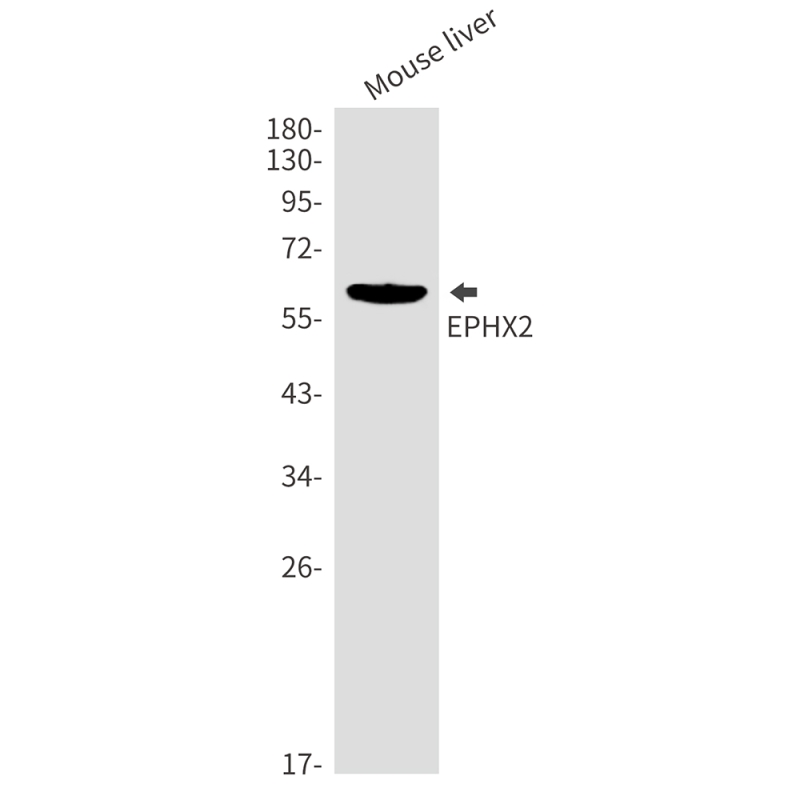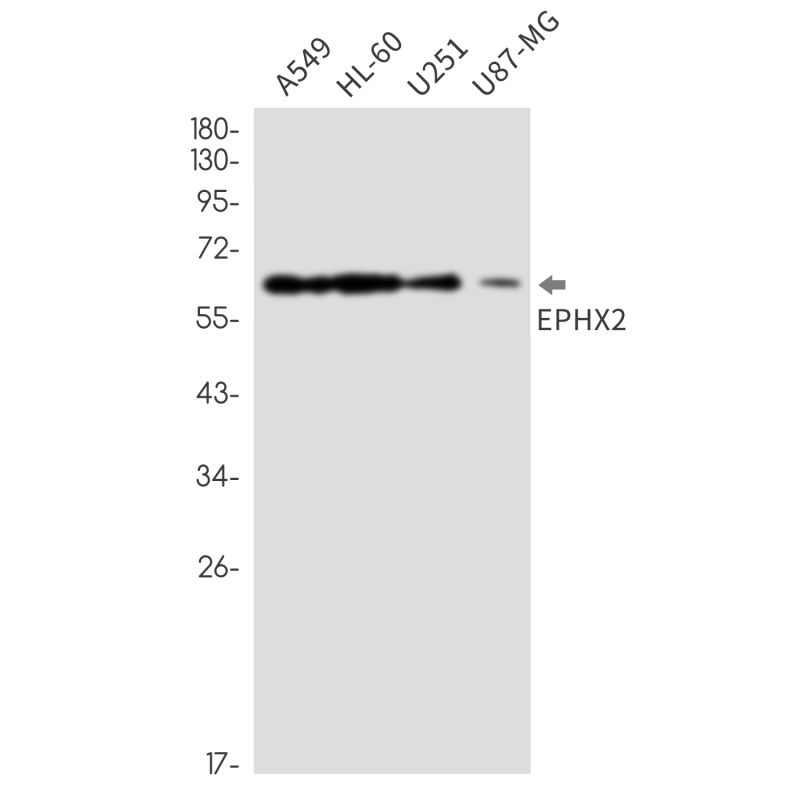

| WB | 1/500-1/1000 | Human,Mouse,Rat |
| IF | 咨询技术 | Human,Mouse,Rat |
| IHC | 咨询技术 | Human,Mouse,Rat |
| ICC | 技术咨询 | Human,Mouse,Rat |
| FCM | 咨询技术 | Human,Mouse,Rat |
| Elisa | 咨询技术 | Human,Mouse,Rat |
| Aliases | CEH; SEH; ABHD20 |
| Entrez GeneID | 2053 |
| WB Predicted band size | Calculated MW: 63 kDa; Observed MW: 63 kDa |
| Host/Isotype | Rabbit IgG |
| Antibody Type | Primary antibody |
| Storage | Store at 4°C short term. Aliquot and store at -20°C long term. Avoid freeze/thaw cycles. |
| Species Reactivity | Human,Mouse |
| Immunogen | A synthetic peptide of human EPHX2 |
| Formulation | Purified antibody in TBS with 0.05% sodium azide,0.05%BSA and 50% glycerol. |
+ +
以下是关于Epoxide Hydrolase 1(EPHX1)抗体的参考文献,简要概括如下:
1. **文献名称**:*"Characterization of a monoclonal antibody against human microsomal epoxide hydrolase 1 (EPHX1)"*
**作者**:Morisseau C, et al.
**摘要**:该研究开发并验证了一种针对人源EPHX1的单克隆抗体,通过免疫印迹和免疫组化分析,证实其特异性及在肝组织中的定位,为代谢相关研究提供工具。
2. **文献名称**:*"Epoxide hydrolase 1 (EPHX1) expression in lung cancer: Immunohistochemical detection using a novel antibody"*
**作者**:Yang X, et al.
**摘要**:研究者利用新型EPHX1抗体,通过免疫组化分析肺癌组织中EPHX1的分布及表达水平,发现其与肿瘤进展和患者预后相关。
3. **文献名称**:*"Validation of anti-EPHX1 antibodies for studying enzyme function in cellular models"*
**作者**:Decker M, et al.
**摘要**:该研究评估了多种商业EPHX1抗体的特异性,通过敲除细胞系验证其可靠性,并应用于研究EPHX1在细胞氧化应激反应中的功能。
4. **文献名称**:*"Epoxide hydrolase 1 regulates inflammation by promoting NLRP3 inflammasome activation via antibody-mediated detection in macrophages"*
**作者**:Li H, et al.
**摘要**:通过特异性抗体检测,揭示EPHX1在巨噬细胞中通过调控NLRP3炎症小体活性参与炎症反应,为疾病机制研究提供新方向。
这些文献涵盖了EPHX1抗体的开发、验证及在疾病模型中的应用,涉及代谢、癌症和炎症等领域。
Epoxide hydrolase 1 (EPHX1), also known as microsomal epoxide hydrolase, is a critical enzyme involved in the metabolism of xenobiotics and endogenous epoxide-containing compounds. It catalyzes the hydrolysis of reactive epoxides into less reactive diols, playing a dual role in detoxification and activation of procarcinogens. EPHX1 is highly expressed in the liver and other tissues, contributing to the processing of environmental toxins, drugs, and lipid-derived signaling molecules. Dysregulation of EPHX1 activity has been linked to diseases such as cancer, chronic obstructive pulmonary disease (COPD), and neurodegenerative disorders, making it a target for therapeutic and biomarker research.
Antibodies against EPHX1 are essential tools for studying its expression, localization, and function in biological systems. They are widely used in techniques like Western blotting, immunohistochemistry (IHC), and enzyme-linked immunosorbent assays (ELISA) to quantify protein levels in tissues, cell lysates, or biofluids. These antibodies help investigate EPHX1's role in drug metabolism, oxidative stress responses, and disease mechanisms. Specificity and cross-reactivity (e.g., with rodent orthologs) are key validation parameters, ensuring accurate detection across experimental models. Research applications also include assessing interindividual variability in EPHX1 expression, which may influence susceptibility to toxin-mediated pathologies or drug efficacy.
×